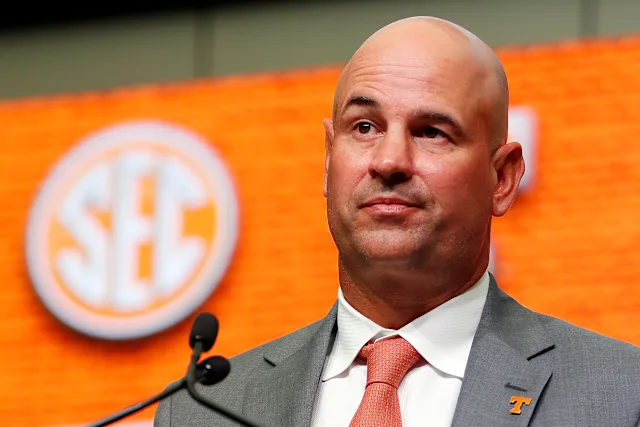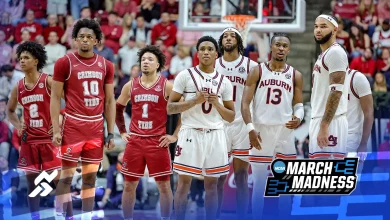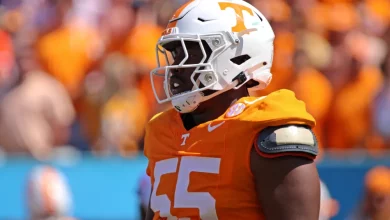Ex-Tennessee football coach Jeremy Pruitt is suing the NCAA for $100 million in lost earnings, according to reports.

In a dramatic turn of events that has sent shockwaves through the college football world, former Tennessee football coach Jeremy Pruitt has filed a lawsuit against the NCAA seeking $100 million in damages for lost earnings. The suit, which claims that the NCAA’s actions led to Pruitt’s premature dismissal and tarnished his professional reputation, raises significant questions about the power of collegiate athletics organizations, the treatment of coaches, and the intersection of law and sports. This legal battle is not only a personal one for Pruitt but also a high-profile case that could have long-lasting implications for college football and the NCAA’s handling of employment disputes and enforcement actions.
The lawsuit, filed in federal court, is just the latest chapter in a saga that has been unfolding for several years, marked by Pruitt’s tumultuous tenure as head coach of the Tennessee Volunteers and the ensuing fallout following his firing in 2021. This legal action paints a picture of a man who believes he was wronged and is seeking compensation for what he feels is a career derailed by actions outside of his control. But for many, the lawsuit is also a reckoning with how the NCAA conducts its investigations and enforces its rules, particularly when it comes to its treatment of coaches and other personnel within the world of college athletics.
Pruitt’s Career at Tennessee: A Promising Start and Abrupt End
Jeremy Pruitt’s time at Tennessee was a rollercoaster of highs and lows, a brief tenure defined by unmet expectations and scandal. When Pruitt was hired as the Vols’ head coach in 2018, he was seen as a promising young coach with a strong defensive pedigree. Having worked as a defensive coordinator for high-profile programs like Alabama and Georgia, Pruitt was regarded as a rising star in the coaching ranks. Tennessee, under the leadership of athletic director Phillip Fulmer, hoped Pruitt would return the program to national prominence after a series of disappointing seasons.
Pruitt’s first two seasons at Tennessee were a mixed bag. In 2018, he led the Vols to a 5-7 record, but there were flashes of potential. By 2019, Pruitt’s Vols showed some signs of progress, finishing with an 8-5 record and a strong showing in the Gator Bowl. Despite these signs of improvement, however, Pruitt’s overall record at Tennessee remained underwhelming. The program failed to live up to the expectations set for it, and the Vols never made it to a major bowl game or contended for an SEC title under Pruitt’s leadership.
The 2020 season was a disaster for Tennessee and Pruitt. After an initial promising start, the Vols dropped several games and ultimately finished the season with a 3-7 record. The Vols’ performance on the field was disappointing, but it was off-the-field issues that would ultimately lead to Pruitt’s downfall.
In January 2021, Tennessee fired Pruitt after a series of NCAA violations were uncovered. The violations, primarily related to recruitment and improper benefits given to players, led the university to part ways with Pruitt before the end of his third season. The firing was a blow to Pruitt’s career and reputation, as it was widely seen as a failure to meet the expectations placed upon him when he was hired. But the story didn’t end there.
The Allegations: NCAA Violations and the Fallout
The firing of Pruitt came on the heels of an internal investigation at Tennessee into alleged NCAA violations. The university had launched a probe into the football program after receiving reports of improper recruiting practices, including the potential for illegal benefits given to recruits and players. Pruitt, along with several assistants, was accused of violating NCAA rules, and the university ultimately decided to fire him with cause in January 2021. Tennessee also self-imposed sanctions on the football program, including a postseason ban for the 2021 season, in an effort to mitigate the damage caused by the allegations.
While Pruitt was let go, the repercussions for the football program were significant. Tennessee’s football program, once a powerhouse in the SEC, faced severe consequences, including probation and scholarship reductions. The scandal also took a toll on the university’s reputation and recruiting prospects. The fallout from the violations became a defining moment in the program’s history and cast a long shadow over the football program’s future.
However, Pruitt vehemently denied the allegations of wrongdoing. He maintained that he was unaware of any improper actions within his program and that he was unjustly fired as a result of the NCAA investigation. Pruitt’s legal battle with the university was eventually settled, but the stain of the violations continued to hang over his career. For Pruitt, the case became a symbol of a larger issue facing college coaches—one where the NCAA’s enforcement actions could not only destroy a team’s season but ruin the careers of those involved, regardless of their actual knowledge of the violations.
The Lawsuit: Claims of Lost Earnings and Defamation
In response to his firing and the aftermath of the NCAA violations, Jeremy Pruitt has now turned to the courts to seek justice. Pruitt’s lawsuit against the NCAA, filed in federal court, claims that the organization’s actions led to the loss of his job, his reputation, and ultimately, millions of dollars in potential earnings. According to the lawsuit, Pruitt is seeking $100 million in damages for what he asserts is the NCAA’s unjust treatment of him and the career-altering consequences that followed.
Pruitt’s legal team argues that the NCAA’s investigation was flawed, its decision-making biased, and its punishment disproportionate to the alleged violations. They contend that Pruitt was unfairly targeted and held accountable for the actions of others, despite his lack of direct involvement in the violations. The lawsuit asserts that Pruitt’s reputation was damaged by the allegations and that his firing was a direct result of the NCAA’s decisions. The lawsuit also claims that Pruitt was deprived of opportunities for future employment and that the damage to his career has led to substantial financial losses.
Furthermore, Pruitt’s legal team has argued that the NCAA, as the governing body of college athletics, bears responsibility for not providing clear and transparent guidelines regarding compliance. They argue that the NCAA’s inconsistent enforcement of rules has created a system that is riddled with uncertainty and unfairness, with coaches often left to navigate the complex web of regulations without adequate support.
The lawsuit also highlights the broader issue of defamation. Pruitt claims that the public nature of the allegations, combined with the NCAA’s handling of the case, led to a significant hit to his professional reputation. In an era where coaches’ reputations are crucial to their ability to secure future employment, Pruitt argues that the damage to his name has had long-term effects, limiting his career opportunities in the coaching profession.
The Broader Implications of Pruitt’s Lawsuit
While Jeremy Pruitt’s lawsuit is personal, it raises several important questions about the NCAA’s authority, its enforcement practices, and the treatment of coaches in the college athletics system. For years, the NCAA has been criticized for its opaque decision-making processes and the lack of accountability for its own actions. The case could serve as a significant test of the NCAA’s power in the realm of employment law and its responsibility to coaches and other personnel within college sports.
First and foremost, Pruitt’s lawsuit calls into question the fairness of the NCAA’s enforcement system. The NCAA has long been criticized for its inconsistent and often controversial rulings on matters of compliance. Coaches like Pruitt have argued that they are often held to unreasonable standards, with little room for nuance or understanding of the complexities of running a large college football program. The lawsuit could serve as a catalyst for change within the NCAA, prompting a reassessment of its approach to enforcing rules and punishing coaches.
Additionally, the case highlights the precarious nature of coaching contracts in college athletics. In a high-pressure environment where results are expected immediately, coaches often face tremendous scrutiny, and even a single scandal or violation can derail an otherwise promising career. Pruitt’s lawsuit underscores the vulnerability of coaches, who can lose their jobs and their livelihood due to actions that may be beyond their control. It also raises concerns about the protections in place for coaches who are accused of violations and whether they have enough recourse to defend themselves against potentially damaging allegations.
Finally, the case serves as a broader commentary on the power dynamics in college sports. The NCAA, as the governing body of college athletics, holds significant authority over coaches, players, and universities. However, its influence has often been called into question, particularly in light of recent developments surrounding players’ rights, NIL (Name, Image, Likeness) compensation, and the growing financial power of college sports programs. Pruitt’s lawsuit may serve as a reminder that even the most powerful organizations are not immune to legal scrutiny and that their actions have real-world consequences for those at the heart of the system.
A Case to Watch
As the legal battle between Jeremy Pruitt and the NCAA unfolds, it’s clear that this case will have far-reaching implications for the world of college football and the broader landscape of college athletics. Whether or not Pruitt ultimately prevails in his lawsuit, the case serves as a stark reminder of the challenges faced by coaches in the high-stakes world of college sports. For Pruitt, the lawsuit is a quest for justice and financial restitution, but it also has the potential to reshape the way the NCAA operates and its treatment of those it governs.
The lawsuit is a cautionary tale for coaches who operate under the watchful eye of the NCAA, emphasizing the fragility of a career in college sports and the complex, often opaque nature of the rules and regulations that govern them. As the case continues, it is likely that the NCAA will be forced to confront questions about its role in college athletics and its responsibility to protect the rights of coaches, players, and other stakeholders within the system.
For now, Jeremy Pruitt’s lawsuit is a legal battle worth watching, as it could be the beginning of a larger movement to reform the NCAA’s practices and provide greater accountability for the decisions that impact the lives and careers of those in the world of college sports.









